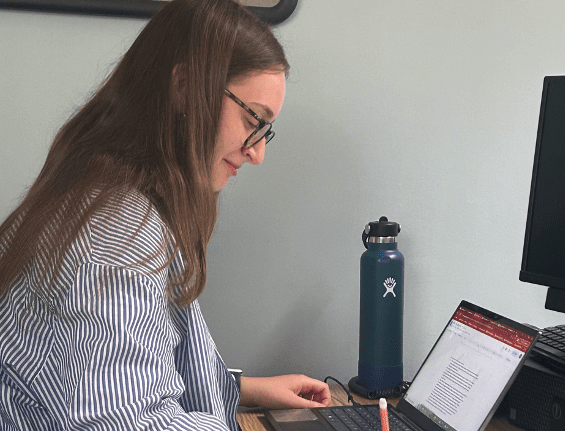Sophie Smyth ’25 is one of 31 student fellows who completed research with a community-based organization in upstate New York this summer as a part of the Upstate Institute Summer Field School. She describes the project below in her own words:
This summer, the Upstate Institute Summer Field School has given me the opportunity to be a fellow at Chenango Health Network. Based in Norwich, N.Y., Chenango Health Network is a rural health network whose mission is to “increase access to health and wellness information and to health care services.” Chenango Health Network houses a variety of programs and coalitions, including Drug Free Chenango, Tobacco Free Chenango, Mental Health First Aid Training, Financial Assistance for Cancer Patients, Health Insurance Assistance, Prescription Assistance, Cancer Support Group, Community Health Advocate, and Substance Use Disorder Community Health Worker. They serve the people in the community of Norwich and Chenango County.
Key informant interviews and focus groups conducted by 2022 Upstate Institute Field School Fellows have shown that youth substance use in Norwich is a community issue that needs to be addressed since its dramatic increase since the COVID-19 pandemic. The 2022 Pride Survey conducted at Norwich High School revealed that youth living in Norwich do not believe that their parents disapprove of youth substance use. To explore this topic further, I am in the process of conducting key informant interviews with parents and their teens living in Norwich.
To begin this interview process, Chenango Health Network recruits Norwich parents who have a teen between the ages of 13 and 17. The incentives for participating are $30 Amazon gift cards for the parents and $5 Stewart’s gift cards for teens. As I schedule an interview with a parent, I inform the parents of these rewards and the nature of the interview, which I have conducted both in person and over Zoom.
Before the interview, it is my responsibility to create a warm, inviting atmosphere and explain the confidentiality and privacy of their responses. Most importantly, I ask for permission to record the interview, which allows me to then transcribe the interview after it is completed. The interviews I conduct consist of me asking questions from the Community Anti-Drug Coalitions of America (CADCA) about youth substance use and parent attitudes surrounding the situation. I also implement interpersonal skills during the interview, such as being attentive, listening carefully, and staying neutral. Afterwards, I thank them for their time, allow them time to ask questions, and give participants their incentives. I then use Otter.ai technology to transcribe the interviews and edit them.
The eventual goal of the work I am doing this summer is to assist Chenango Health Network in updating their logic models. Logic models are used to help organizations implement their solutions to community issues. They are made up of three main components: problem, root causes, and local conditions. The problems in Norwich that I am specifically working on logic models for are youth alcohol, marijuana, and tobacco use. Each aspect of a logic model requires supporting data to validate the problems, root causes, and local conditions. I have been using data from the 2022 Pride Survey and other youth and parent surveys to update the current logic models for alcohol, marijuana, and tobacco. As Chenango Health Network is entering year five of the Drug Free Chenango Coalition grant, these logic models are essential when applying for years six through ten of the grant. My project this summer conducting key informant interviews will provide data to update these logic models during the grant application process.
I am extremely grateful for this opportunity to take part in community-based research at Chenango Health Network this summer. This experience has allowed me to work on a project that has managed to combine multiple of my passions. A substantial part of working towards my degree in neuroscience is learning about the effects of different substances on the brain and neurological wellbeing of a person. By conducting interviews in a community where substance use is prevalent among youth, I have had a firsthand look into the local conditions that allow this to happen.
In addition to scientific research about the physical and psychological effects of substance use on youth, hearing from both youth and their parents about the topic adds another layer of depth to understanding the issue. Additionally, my work analyzing data and working with logic models has allowed me to grow my passion for math and utilize skills that I have developed while working towards my degree in mathematics. Having the opportunity to analyze real community problems in this way has allowed me to apply my education to a real world setting and directly implement change in a community.
